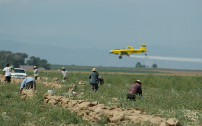Farmworker Justice condemns the House vote to allow House Speaker Paul Ryan to appear as amicus curiae on behalf of the House of Representatives in the Supreme Court case U.S. v. Texas. This case, which will decide the legality the Deferred Action for Parents of Americans and Lawful Permanent Residents program (DAPA) and the expansion of the Deferred Action for Childhood Arrivals program (expanded DACA), is scheduled to be heard by the Supreme Court on April 18th. Speaker Ryan’s brief will oppose the DAPA and expanded DACA programs. The resolution, which would allow Speaker Ryan to represent the entire House of Representatives and use the House Office of General Counsel to file the brief, is inappropriate when so many Members of Congress (186) oppose the position of the Speaker. This move is another in a series of extraordinary, divisive attacks on President Obama and on immigrants.
The President’s actions are a prudent and proper exercise of his authority to enforce immigration laws. Both Republican and Democratic Presidents have used their authority to grant temporary immigration relief to groups of individuals in the country without status. As part of the President’s existing authority to enforce the law, he can and must set priorities, target resources, and shape how laws are to be implemented. Within that responsibility, the President has discretionary authority to execute the laws in a manner that most effectively utilizes limited resources, including through the use of prosecutorial discretion. The deferred action programs will better enable the Department of Homeland Security to target their resources and will result in an even more secure border than we have today.
Farmworker Justice President Bruce Goldstein made the following statement:
“Farmworker Justice continues to defend President Obama’s administrative actions and prepare for implementation of DAPA and DACA in farmworker communities. Roughly 700,000 farmworkers and their spouses could be eligible to come forward to apply for temporary protection from deportation and work authorization under the deferred action opportunities. The programs are well within the President’s authority and are a limited but important step toward addressing our broken immigration system. By eliminating the constant fear of deportation, farmworkers and other aspiring Americans will be able to contribute more fully to their communities and will be empowered in their workplaces.” Farmworker Justice signed on to the amicus brief submitted by 326 immigrants’ rights, civil rights, labor and social service organizations in support of the US government’s position that DAPA and expanded DACA should be allowed to be implemented. Farmworker Justice will continue to work with groups throughout the country to support and plan implementation of the DAPA/DACA programs and to win legislation that creates a path to citizenship for undocumented farmworker families and other aspiring Americans.
Read moreFarmworker Justice condemns House vote to file amicus in DAPA/DACA Supreme Court case


